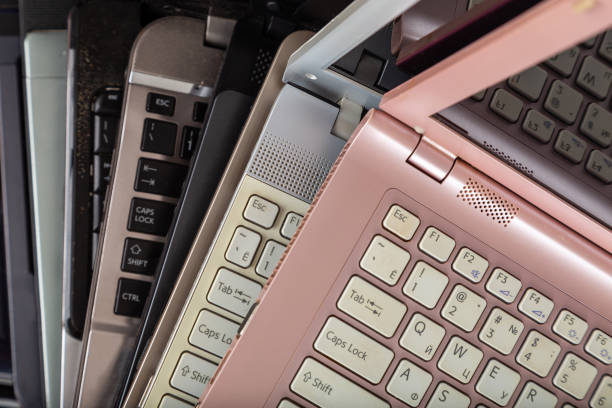
In today’s rapidly evolving digital world, the demand for affordable technology is constantly rising, particularly in emerging markets. One of the most cost-effective solutions for businesses and educational institutions in these regions is the import of used laptops. For wholesalers, this creates a significant business opportunity.
Exporting used laptops in bulk can be both profitable and sustainable, offering access to a global market while contributing to reducing e-waste. This guide will walk you through the key steps in sourcing used laptops wholesale for export, ensuring that your business venture is both successful and compliant with industry standards.
Why Export Used Laptops?
Exporting used laptops is a lucrative venture because it fills a gap in many international markets where access to brand-new laptops is either limited or unaffordable. Countries in Africa, Asia, Latin America, and Eastern Europe have a growing need for refurbished or second-hand electronics. These devices are often more affordable while still offering solid performance for businesses, schools, and individual consumers. By exporting used laptops, wholesalers can provide an essential service while tapping into a highly profitable market.
Additionally, the export of used laptops plays a part in the growing emphasis on sustainability. By reselling laptops rather than discarding them, exporters contribute to the reduction of e-waste and promote recycling within the electronics industry.
Step 1: Understand the Demand in Target Markets
Before sourcing laptops, it’s essential to understand where the demand for used laptops is strongest. Countries with rapidly expanding educational sectors, IT industries, or startup ecosystems are prime candidates. Research specific markets to identify trends and assess which laptop models are most in demand.
- Africa: Countries like Nigeria, Kenya, and Ghana are seeing increased demand for affordable tech solutions, making them key markets for used laptops.
- Asia: India, the Philippines, and Indonesia are also hot markets due to growing tech industries and an increasing emphasis on digital education.
- Eastern Europe: Countries like Poland, Hungary, and Ukraine present opportunities for resellers, particularly for businesses and educational institutions.
- Latin America: Brazil, Argentina, and Mexico are seeing a surge in demand for second-hand electronics.
Step 2: Research the Best Suppliers for Used Laptops
Finding reliable suppliers is one of the most crucial steps in setting up a successful used laptop export business. You’ll need to establish partnerships with companies that deal in refurbished or off-lease laptops, often sourced from large corporations, schools, or government entities that regularly upgrade their equipment.
When looking for suppliers, ensure they provide the following:
- Quality Testing: Laptops should be fully tested and graded based on their condition. Avoid sourcing from suppliers who do not conduct rigorous quality control.
- Warranty: Some suppliers offer limited warranties on refurbished laptops, which can be an attractive selling point when exporting to certain markets.
- Bulk Pricing: Negotiate for the best possible pricing for large orders, as this will directly impact your profit margins.
- Compliance with Regulations: Ensure the supplier complies with both local and international regulations regarding the resale and export of used electronics.
Step 3: Evaluate Marketplace Options for Sourcing
There are many online marketplaces where you can source used laptops wholesale for export. These platforms connect buyers and sellers from around the world, offering a variety of products at competitive prices. Here are some of the top online marketplaces to explore, with eWorldTrade at the top:
- eWorldTrade: A leading global B2B marketplace offering a wide selection of used electronics, including laptops. eWorldTrade is known for its transparency, competitive pricing, and access to verified suppliers across the globe.
- Alibaba: One of the largest B2B marketplaces, Alibaba offers a wide range of suppliers for used electronics, including laptops, at various price points.
- eBay Wholesale: eBay’s wholesale division allows you to buy bulk quantities of used laptops at competitive prices, with an option for international shipping.
- Global Sources: Another major B2B marketplace that connects global buyers with certified suppliers. It offers a variety of electronics, including laptops and other tech products.
- Liquidation.com: This platform specializes in the liquidation of surplus electronics, including bulk quantities of used laptops. It’s a good option for finding deals on higher-end models.
- DHgate: A Chinese wholesale platform similar to Alibaba, offering a wide selection of used and refurbished laptops suitable for export.
- Wholesaler Electronics: A specialized platform that deals specifically in used electronics, including laptops. They offer competitive pricing for bulk purchases.
Step 4: Verify the Legality and Regulations
When sourcing laptops for export, understanding the legal framework in both the exporting and importing countries is vital. Different regions have different regulations regarding the import of used electronics, especially if they are considered “e-waste.” Some countries have strict environmental regulations that limit or ban the import of certain types of used electronics, while others encourage the importation of refurbished devices as a means of increasing access to technology.
To ensure compliance:
- Check Import Regulations: Research the specific import regulations in your target market. For instance, the European Union has stringent regulations on e-waste, while other countries may require specific certifications or documentation.
- Obtain Necessary Certifications: Ensure that your supplier provides certification that verifies the laptops are tested, refurbished, and in working condition. You may also need to provide documentation proving that the laptops meet certain safety or performance standards.
- Understand Tariffs and Duties: Research the tariffs and duties imposed on imported electronics. Understanding these costs will help you price your products competitively in the target market.
Step 5: Build Relationships with Logistics Providers
Exporting used laptops involves more than just sourcing the product. You’ll need to establish relationships with reliable shipping and logistics providers to ensure that your products reach their destination on time and in good condition.
When choosing a logistics provider, consider the following:
- Experience with Electronics: Choose a provider experienced in handling electronics, as these shipments often require careful handling and packaging.
- International Shipping Expertise: Ensure that the provider has experience with international shipping and can help you navigate the complexities of customs and import/export regulations.
- Cost-Effective Solutions: Shipping costs can significantly impact your profit margins, so it’s important to find a provider that offers competitive pricing for bulk shipments.
Step 6: Quality Control and Customer Satisfaction
Once you’ve established your supply chain and logistics, quality control becomes critical. Inspect shipments to ensure that laptops are in the promised condition. Work closely with your suppliers to implement consistent quality checks, and consider offering after-sales support or warranties in certain markets to increase customer trust.
Satisfied customers will likely become repeat buyers, which is essential for growing a wholesale export business. Maintaining a reputation for reliability and quality will distinguish you from competitors in the global market.
Conclusion
Sourcing used laptops wholesale for export can be a profitable and rewarding business if done correctly. By understanding the demand in target markets, finding reliable suppliers, and adhering to legal regulations, you can establish a strong presence in the global used electronics trade. Leveraging top marketplaces like eWorldTrade will allow you to access a broad range of suppliers, ensuring you provide quality products at competitive prices. With careful planning and attention to detail, your business can thrive in this growing sector.




